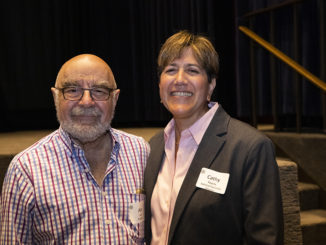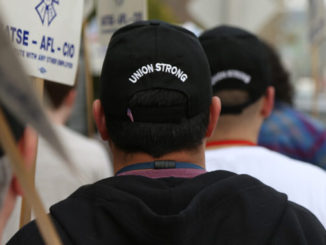
By A.J. Catoline
Who is actually working right now?
This was the monumental question asked at a recent general meeting, where Editors Guild members packed the DGA theatre on Sunset Boulevard in the heart of Hollywood.
Only half the room raised their hands, but members have come to expect this reality. Nearly six months after the historic double strikes of SAG and WGA concluded with successful deals for the actors and writers, Hollywood is still not fully back to work. FilmLA, the organization that handles production permits across the vast location of Los Angeles, reported in mid-April that television shoot days are down more than 32% compared to the same period before the strikes.
If production is lagging, then it is self-evident what is happening in post-production. Some workers see optimistic signs that production will pick back up soon. Still, the question remains, how can the Editors Guild help members struggling today?
A HARDSHIP FUND FOR MEMBERS
In addition to offering a dues waiver program since the third quarter of last year, the Board of Directors overwhelmingly approved in September the creation of the Local 700 Hardship Relief Fund, which is specifically intended to help Guild members who are struggling financially because of the industry’s recent downturn. The board approved a founding donation from the Guild treasury of $130,000.
Members in need can apply to the Entertainment Community Fund (ECF) for individual hardship grants of $1,000. As of mid-April, more than $76,000 has been donated to Guild members. The ECF administers the application process and disbursement from Local 700’s hardship fund, and the $1,000 is in addition to what a member might receive from the ECF in general assistance (with qualifying proof of hardship).
If members want to donate to support the fund, they can do so here.
“Our Guild cares about its members, it’s one of our core values,” said Shiran Carolyn Miller, who spearheaded the hardship fund project as a board member representing picture editors. “We look out for each other. I can confidently say that the vast majority of my fellow MPEG members share my belief.”
A member who recently had $1,000 transferred to their bank account sent a text to Miller, of which she keeps a screenshot on her phone. “it feels so nice to be looked out for like this,” wrote the member. “I’m just so touched. I can’t tell you how much [this donation] means to me. I just told my Grandma and she cried. Thank you.”
As Guild members waited for the general meeting to be called to order on April 21, they chatted over coffee and breakfast sandwiches about the “Many Crafts, One Fight” ahead in the IATSE general negotiations. Members shared they were hearing from post producers that much editorial work may be outsourced to Canada where rates are lower and unions are weaker.
“I’ve been an editor in this business for more than 20 years,” one Guild member said, “and I’ve never seen it this bad.” Members are trying to make it work, improvising to find what employment they can while waiting for more jobs, they hope, to pick back up soon.
Despite the unease, there was pride in having a place to come together as a union. A place to share stories about how members are getting through this work slowdown together. There was determination that, come what may, the industry will be back.
National Executive Director Cathy Repola struck a tone of optimism. While she acknowledged that there was consternation about the lack of jobs, she assured members that the union would stay strong and focused on negotiations ahead. Local 700 and the other Hollywood locals are standing strong to “take an agreement back to the members that they actually want to ratify,” said Repola.
Last June, the board of directors approved a strike fund to support members in the event of a future labor action. The board intended to make a clear commitment and voted unanimously to seed the strike fund with $250,000 to grow in an investment. However, the fund can only be accessed by members in a hypothetical IATSE general strike in a future negotiation.
Board members discussed if something could be done to help members struggling to make ends meet in an industry stalled by production budget austerity — the so-called Great Contraction of Hollywood.
In past years, individual board members have presented initiatives for a hardship fund. Some of these proposals immediately had majority support and others questioned if it is indeed the role of the Guild to help members beyond bargaining for pay and working protections that are the traditional role and jurisdiction of a union. The ultimate goal always was serving what was in the very best interest of the members.
The majority opinion was that the effort was premature without further details of how such a fund could work.
“There was a lack of sufficient information,” Miller recalled. “A deep dive was needed.”
Miller took the initiative and sent out an email to her friends and colleagues — more than 350 Guild members — asking if a MPEG-specific hardship fund were to be set up, would they donate? And if so, how much? Response to the email was positive and the informal poll reported that more than $25,000 would be pledged.
“I prepared all this information and presented it to the board, which voted to approve an official working group to hash out the vetting criteria for such a fund,” Miller said.
The work group for a hardship fund — consisting of board member volunteers assisted by Executive Administrator Lisa Dosch — went to work in the dog days of the 2023 summer strikes. They reached out to the Entertainment Community Fund which had already set up funds to support members of other IATSE locals.
PERSISTENCE PAYS
Ashley McKinney, a board member representing assistant editors, recalls the persistence of the work group. “I had been emailing Shiran and even Cathy Repola about the idea to create a hardship fund since 2021,” McKinney said. “When I joined the board, I helped Shiran push for it hard. We knew how complicated it might be, but felt it was incredibly important for the members. Giving up was not an option.”
On July 20 came a welcome opportunity. The non-profit organization Union Plus, founded by the AFL-CIO to support workers, announced a contest to award members who volunteered for not just their local but also their community.
Miller submitted an application and video presentation highlighting her advocacy for fellow union kin, including spearheading the effort in the MPEG website committee to help connect members needing extra work hours for the Motion Picture Industry health plans.
She went on to win the grand prize among thousands of entrants — a check for $40,000.
“I was overwhelmed, but I knew we now had some seed money for a hardship fund,” recalls Miller, who pledged publicly to donate the prize money to Guild members in need.
At a special meeting in September 2023, the board of directors voted overwhelmingly to create the hardship fund for members of Local 700. That fund is now here and ready to help MPEG members in need.
After submitting an application to the Entertainment Community Fund with qualifying proof of financial hardship, members may be awarded $1,000.
“If you are deemed eligible for financial assistance, you’ll get access to this additional resource, just for being one of us,” said Miller. “To me, that’s the true meaning of union brothers, sisters and kin.”
McKinney expressed optimism that “the fund will help members in many different ways. $1000 doesn’t seem like a whole lot up front and doesn’t always cover the true cost of someone’s needs, but it can at least give them a helping hand from their community,” said McKinney.
Looking back at extensive debate in the board, McKinney was confident that it turned out to be a positive as it strengthened the argument and helped clarify the vision for the fund.
“In everyday life, persistence is key to work in this business,” said McKinney. “I don’t think I’ve ever met anyone more persistent than Shiran. We pushed and researched and spent hours finding ways to make it happen for the members.
“There were moments where it honestly felt like we failed but we used that as motivation to get it past the finish line,” recalls McKinney. “I’m a St. Louis Blues fan, so I know that after disappointment, you pick yourself up and try again.”
Perhaps the many members of the Editors Guild struggling in these times could, at the least, be comforted by such advice.
Here is a “one-stop-shop” of helpful resources on the MPEG website.





